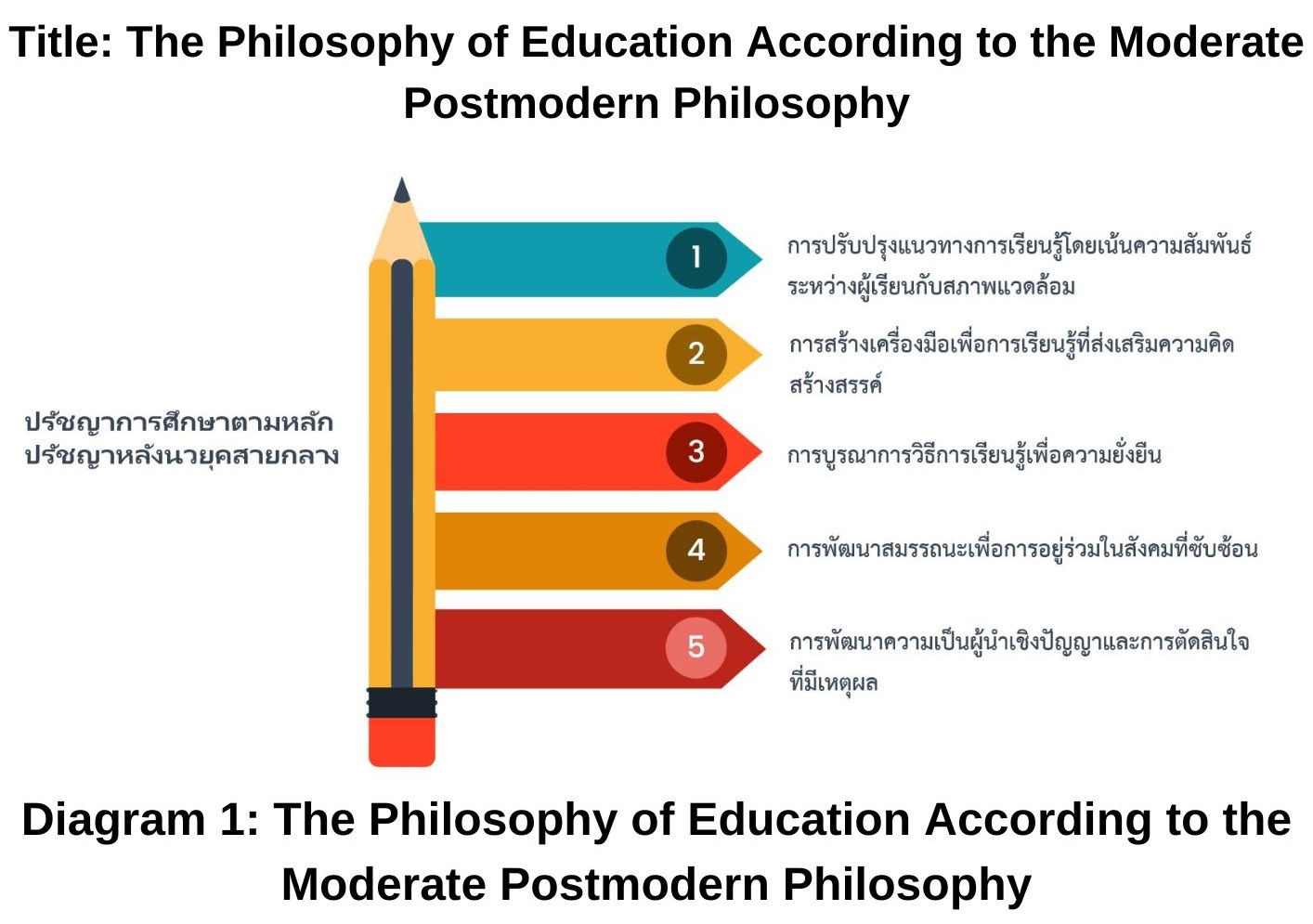The Philosophy of Education According to the Moderate Postmodern Philosoph
Keywords:
Philosophy of Education, Postmodern, Moderate Postmodern, Moderate Postmodern PhilosophyAbstract
This research article is a qualitative study utilizing document analysis. Its objective is to analyze the philosophy of education according to the moderate postmodern philosophy. The findings reveal that postmodern educational philosophy emphasizes challenging traditional frameworks and embraces diverse interpretations, rejecting absolute reality or a single definition that applies universally. In the context of education, this philosophy focuses on promoting flexible learning, openness to diverse perspectives, and encouraging equal participation of learners in the educational process. The key characteristics of educational philosophy according to postmodern principles include: 1) rejection of absolute truth, 2) critical interpretation, 3) diversity and acceptance of differences, 4) holistic learning, 5) dialogue and aesthetic discussion, 6) re-reading without diminishing any aspect, and 7) the aim of education to enhance the quality of life for both learners and educators. The new knowledge gained from this research includes that the philosophy of education according to the moderate postmodern philosophy consists of challenging traditional thought, rejecting absolute truth, critical interpretation, promoting diversity and acceptance of differences, holistic learning, dialogue and aesthetic discussion, re-reading without diminishing anything, and the goal of education to improve the quality of life.
References
กันยาวีร์ สัทธาพงษ์. (2562). การประยุกต์ใช้อรรถปริวรรตการตีความปรัชญาของเศรษฐกิจพอเพียงในเรื่องเกษตรทฤษฎีใหม่เพื่อสร้างสมดุลชีวิตอย่างยั่งยืนด้วยมุมมองปรัชญาหลังนวยุค. วารสารเซนต์จอห์น, 22(30), 236-253.
กีรติ บุญเจือ. (2545). ปรัชญาหลังนวยุค แนวคิดเพื่อการศึกษาแผนใหม่. กรุงเทพฯ : สำนักพิมพ์ดวงกมล.
เจตนิพัทธ์ พิธิยานุวัฒน์ และคณะ. (2564). อุเบกขากับปรัชญาหลังนวยุคสายกลาง. วารสารสันติศึกษาปริทรรศน์ มจร, 9(5), 2051-2063.
ชิสา กันยาวิริยะ และ สิรินทร์ กันยาวิริยะ. (2567). ผู้นําคุณธรรมตามหลักปรัชญาหลังนวยุคสายกลาง. วารสารสถาบันพอดี, 1(6), 9-18.
พระครูโอภาสสราธิคุณ (ชาตรี อาสโภ). (2564).พุทธธรรมาภิบาลกับปรัชญาหลังนวยุคสายกลาง. วารสารสันติศึกษาปริทรรศน์ มจร, 9(4), 1444-1454.
พระมหามฆวินทร์ ปุริสุตฺตโม. (2561). ปรัชญาสากล : วิเคราะห์และวิจารณ์. วารสารศึกษาศาสตร์ มมร, 6(1), 1-28.
พระมหาอนันต์ อนุตฺตโร (อันวิเศษ) และคณะ. (2565). หลังโครงสร้างนิยมกับอรรถปริวรรต. วารสารปรัชญาปริทรรศน์, 27(2), 257-271.
พระวิทยา ญาณเวที. (2563). ปรัชญาการศึกษากับรูปแบบการจัดการศึกษาของมหาวิทยาลัยในสังคมไทย. วารสาร มจร ปรัชญาปริทรรศน์, 3(2), 1-17.
เมธา หริมเทพาธิป. (2559). การมีส่วนร่วมในมุมมองหลังนวยุค. รายงานวิจัย. บัณฑิตวิทยาลัย : มหาวิทยาลัยราชภัฏสวนสุนันทา.
_________. (2561). การมีส่วนร่วมในมุมมองหลังนวยุค. รมยสาร, 16(3), 63-77.
_________. (2563). การจูงใจตนเองในแนวทางหลังนวยุค. วารสารพุทธมัคค์, 5(1), 99-107.
เริงรณ ล้อมลาย และสุการต์พิชา ปิยะธรรมวรากุล. (2563). แนวคิดทางปรัชญาการศึกษาในบริบทของการศึกษาไทยระดับอุดมศึกษา. วารสารสหวิทยาการมนุษยศาสตร์และสังคมศาสตร์, 3(3), 357-366.
สิรินทร์ กันยาวิริยะ และ ชิสา กันยาวิริยะ. (2567). การบริหารแบบมีส่วนร่วมตามหลักปรัชญาหลังนวยุคสายกลาง. วารสารสถาบันพอดี, 1(7), 27-40.
สุดธิณีย์ ทองจันทร์, เมธา หริมเทพาธิป และ กีรติ บุญเจือ. (2563). การพัฒนาคุณภาพชีวิตผู้ป่วยด้วยหลักปรัชญาหลังนวยุคสายกลาง. วารสารการวิจัยการบริหารการพัฒนา. 10(1), 31-41.
สุนทร ณ รังษี. (2537). ปรัชญาอินเดีย : ประวัติและลัทธิ. กรุงเทพฯ : สำนักพิมพ์จุฬาลงกรณ์มหาวิทยาลัย.

Downloads
Published
How to Cite
Issue
Section
License
Copyright (c) 2024 Institute of Sufficiency Journal

This work is licensed under a Creative Commons Attribution-NonCommercial-NoDerivatives 4.0 International License.



